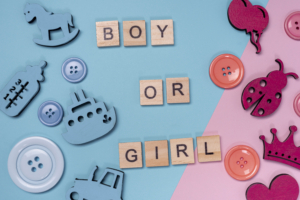Personal names are one of the most fundamental ways we identify ourselves and others. They are the words we use to introduce ourselves, to address others, and to distinguish one person from another. But names are not just arbitrary labels – they are deeply tied to our identities, our cultures, and our societies. Have you ever thought what makes a name feminine or masculine? Is it the sound of it, the culture it is used in, or the familiarity around its understanding or meaning? In today’s article we will try to answer these questions and clarify some aspects of gender-specific names.
The Symbolism of Sounds in Determining the Gender of a Name
A person’s name can provide important information about their cultural background and gender, which are key elements of their identity in today’s society. Cultural norms and gender expectations often shape naming conventions, making a person’s name a reflection of their social and cultural identity. The gender-specific names are linked to what is going on inside our brain when hearing a name, as this is deeply embedded in our neural system, depending on the environment we grew up in. Based on an ongoing study concerning the symbolism of sounds, researchers have discussed this matter using two made-up words bouba and kiki and asked people how they perceive those sounds. The results indicated that most people associated the word bouba with round objects, while kiki was linked to spiky objects. It seems like the sonority of words are more likely to predetermine the way we make the connection between a word and a concept.
The symbolism of sounds in names is a fascinating concept that highlights the intriguing relationship between phonetics and perception. Certain phonetic elements within a name can evoke associations, from gender to personality traits, cultural origins,  and emotional responses. Soft vowel sounds and endings like -a often lend a feminine touch, while consonants and harder vowel sounds lean towards masculinity. Names that flow might seem gentle, while strong sounds make us think of confidence. Different cultures and stories can also influence what we feel about a name’s sound. However, in today’s world, modern naming trends embrace individuality, breaking free from traditional sound-symbolism norms. So, while sounds may offer hints in relation to one’s gender, personality, or even cultural identity, there is no such thing as a set of naming rules; it’s a mix of language, culture, and personal choice. Still, can predictions be made accurately? We believe so!
and emotional responses. Soft vowel sounds and endings like -a often lend a feminine touch, while consonants and harder vowel sounds lean towards masculinity. Names that flow might seem gentle, while strong sounds make us think of confidence. Different cultures and stories can also influence what we feel about a name’s sound. However, in today’s world, modern naming trends embrace individuality, breaking free from traditional sound-symbolism norms. So, while sounds may offer hints in relation to one’s gender, personality, or even cultural identity, there is no such thing as a set of naming rules; it’s a mix of language, culture, and personal choice. Still, can predictions be made accurately? We believe so!
Sounds that Predict a Name’s Gender
Research on names conducted in different countries offers insights into naming trends, cultural preferences, and linguistic influences. Such research often delves into aspects previously mentioned, including but not limited to naming popularity, trends, historical shifts, and cultural variations. Here are some key findings from research on names in various countries:
Names in the USA
In the United States of America, research has been conducted to explore how certain sounds in names are associated with gender perceptions. The statistics for a recorded number of 270 million baby names from USA have been analyzed and th e results have shown that the names beginning with hard or voiced phonemes, such as B, D, R, L, M and so on, in the names like Brian, Richard or Michael, are more likely to be given to boys. The girls would be more likely to receive names starting with soft or unvoiced phonemes – F, H, P, S, T – such as Heather, Sarah or Tina. However, due to the country’s diverse population and evolving naming trends, the country showcases an increasing trend of gender-neutral names that break away from conventions, such as Jordan, Avery, or Riley.
e results have shown that the names beginning with hard or voiced phonemes, such as B, D, R, L, M and so on, in the names like Brian, Richard or Michael, are more likely to be given to boys. The girls would be more likely to receive names starting with soft or unvoiced phonemes – F, H, P, S, T – such as Heather, Sarah or Tina. However, due to the country’s diverse population and evolving naming trends, the country showcases an increasing trend of gender-neutral names that break away from conventions, such as Jordan, Avery, or Riley.
Japanese Names
In Japan, it has been examined how sounds in names are linked to meanings and qualities. For instance, names like “Haruka” (meaning “distant”) and “Akira” (meaning “bright”) use specific phonetic elements to convey particular attributes. The male name Haruki (meaning “shining sun”) combines the softness of Ha with the assertiveness of ki, reflecting a balance between warmth and strength. Similarly, the female name Emi (meaning “beautiful blessing”) uses the gentle sound of e to convey a sense of elegance. Japanese parents often consider both the phonetic sound and the meaning when selecting names for their children.
Names of India
In India, the linguistic diversity across regions makes names a fascinating field of study. For instance, the neutral name Arya (meaning “noble” or “honorable”) uses soft vowel sounds to reflect the concept of virtue. On the other hand, the male name Vikram (meaning “valor”) employs stronger consonants to convey strength and courage. Research on names in India often navigates multiple languages and cultural meanings, reflecting the intricate tapestry of the country’s identity.
Swedish Names
 Finally, research in Sweden has explored how sounds in names align with gender perceptions and societal attitudes. Names like Elsa, Astrid, and Isabella are associated with femininity due to their softer and melodic sounds. On the other hand, names like Oskar, Erik, and Victor are often considered masculine because of their stronger consonant sounds. Like the USA, Sweden also stands out for embracing gender-neutral names like Alex or Noel, challenging conventional sound associations and reflecting evolving attitudes toward gender identity.
Finally, research in Sweden has explored how sounds in names align with gender perceptions and societal attitudes. Names like Elsa, Astrid, and Isabella are associated with femininity due to their softer and melodic sounds. On the other hand, names like Oskar, Erik, and Victor are often considered masculine because of their stronger consonant sounds. Like the USA, Sweden also stands out for embracing gender-neutral names like Alex or Noel, challenging conventional sound associations and reflecting evolving attitudes toward gender identity.
A clear connection can be observed between the names’ genders and semantics, starting with the idea that the names originating from adjectives associated to the physical force are regarded as being masculine, and those that refer to the concepts of beauty as being feminine. For example, let’s take the name Arthur. With its spelling variant Artur in many Slavic, Germanic and Romance languages, it derives from the Celtic Artos, which means “bear”. At the opposite pole, there is the female name Nadia, that has many variants and correspondence in other languages: Nadya/Nadyezhda (Russian, Bulgarian), Nadiya (Ukrainian), Nadiyyah (Arabic), with the global meaning of “hope” in the Slavic culture, and “tender” or “delicate” in Arabic. It was adopted by many cultures which kept its original meaning and is linked to female gender stereotype.
These examples highlight the intricate relationship between sounds in names and their cultural, linguistic, and societal significance. While certain sound patterns carry associations, they are influenced by a range of factors, including historical context, linguistic evolution, and contemporary social dynamics. As names continue to evolve, the study of sounds in names remains a dynamic field that bridges language, culture, and identity.
When Culture Makes a Difference
 The name practices and name genders’ particularity to adapt to the cultural environments and conventions are seen by psychologists as suffering from what they call functional fixedness. This is defined as an object’s function to shadow other possible uses. Moreover, living in a gendered society has demonstrated that the everyday usage of a proper name and the familiarity around make it hard to change its rooted understanding and meaning. For the majority of cultures, the proper name is used to show the individuality, or “I” identities, while the surname determines the “We” identities. The following are all examples of ways in which culture shapes naming and gendering conventions, while it also allows itself to be shaped by these in turn:
The name practices and name genders’ particularity to adapt to the cultural environments and conventions are seen by psychologists as suffering from what they call functional fixedness. This is defined as an object’s function to shadow other possible uses. Moreover, living in a gendered society has demonstrated that the everyday usage of a proper name and the familiarity around make it hard to change its rooted understanding and meaning. For the majority of cultures, the proper name is used to show the individuality, or “I” identities, while the surname determines the “We” identities. The following are all examples of ways in which culture shapes naming and gendering conventions, while it also allows itself to be shaped by these in turn:
- Pop Culture Influence: Names from popular movies, TV shows, or books can suddenly become trendy, regardless of traditional gender associations. For instance, Arya gained popularity as a girl’s name after the character Arya Stark in “Game of Thrones”. Commonly found in various cultures, including Sanskrit, Persian, and Indo-Iranian languages, in Sanskrit, “Arya” means “noble”, “honorable”, or “spiritual”.
- Indian Variations: In India, names often hold deep cultural and religious significance. Names can be influenced by astrology, family traditions, and the meanings associated with certain deities. Names like Krishna can be used for both boys and girls, highlighting the cultural flexibility of gendered names.
- Family Traditions and Religious Names: Arabic names often include prefixes like “Abd” (serv
 ant of) followed by the name of Allah or “Umm” (mother of), where “Umm” is used to indicate the mother of the person’s eldest son. While these prefixes might appear gender-neutral, the following name provides a gender context, creating names like Abdullah (servant of Allah) for boys and Umme Salma (mother of Salma) for girls.
ant of) followed by the name of Allah or “Umm” (mother of), where “Umm” is used to indicate the mother of the person’s eldest son. While these prefixes might appear gender-neutral, the following name provides a gender context, creating names like Abdullah (servant of Allah) for boys and Umme Salma (mother of Salma) for girls. - Native American Names: Many Native American names are inspired by nature, animals, or personal attributes. These names often hold spiritual significance and are less tied to traditional gender associations found in Western cultures. A name from the Cherokee tribe, “Tala” means “wolf” and reflects strength and independence.
- International Variations: Different languages have distinct phonetic patterns, leading to different gender associations for the same name. For example, the name “Andrea” is masculine in Italian, but feminine in German.
- Hawaiian Naming: In Hawaiian culture, names often hold a deep connection to nature and history. Unisex names like Kai (meaning “ocean”) and Mālie (meaning “calm”) reflect this connection and can be used for both boys and girls.
- Sound Psychology: Certain sounds are thought to convey emotions or traits. For instance, names with s sounds might be seen as soothing or calming, while names with t sounds might feel more energetic.

After presenting how a name’s gender is determined psychologically, culturally and from the point of view of its sonority, we can move on to how the gender can be predicted using a software and to find out its practical use cases.







